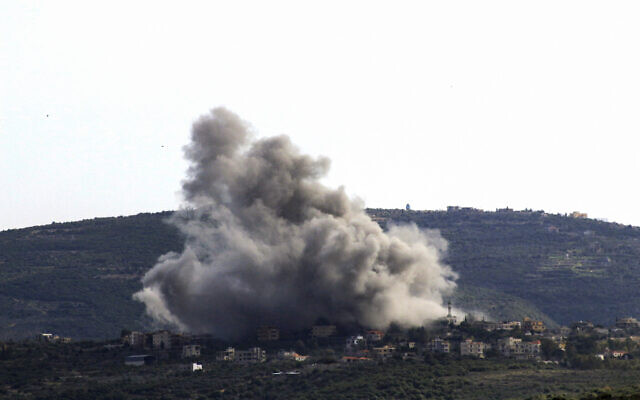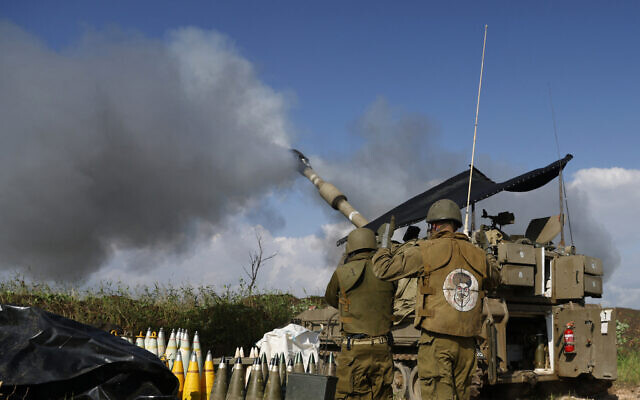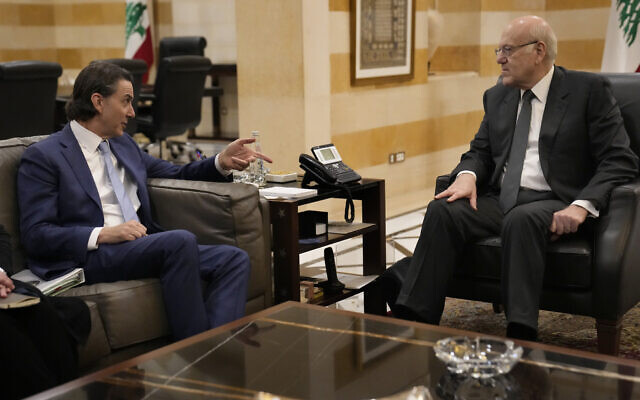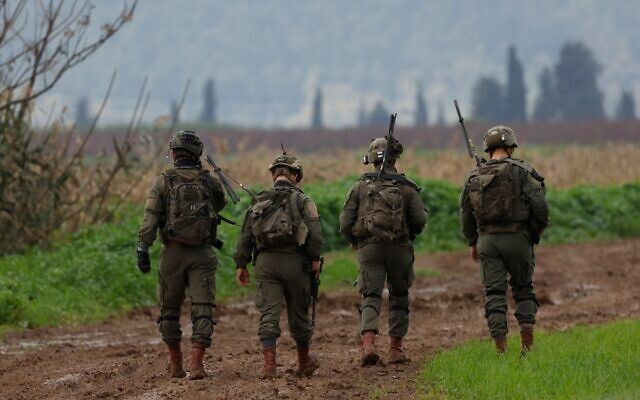After UAV attack, IDF hits Hezbollah airstrip said built by Iran to launch drones
Lebanese terror group claims to target Iron Dome; no damage or injuries caused as drones impact open areas in north
The Israel Defense Forces said it carried out a series of strikes on Thursday against Hezbollah targets in southern Lebanon, including an airstrip, as the Lebanese terror group claimed it had targeted Israel’s Iron Dome air defense system.
The airstrip in the Qalaat Jabbour mountain region, revealed by Defense Minister Yoav Gallant last year, had served Hezbollah’s aerial unit, according to the IDF. Israel accused Iran of building the runway, which is thought to be used by its proxy to launch drones.
The IDF said it also struck targets in the areas of Tyre and Mghairiyeh, adding that the strikes came in response to a drone attack on northern Israel earlier in the day, which were later claimed by Hezbollah.
The military later said that it shelled two sites belonging to the terror group in Tayr Harfa and Ayta ash-Shab, and carried out airstrikes on Kafr Kila and an observation post in Blida, also shelling areas in ad-Dhahiriya with artillery.
The Iran-backed terror group launched two explosive-laden drones from Lebanon, which impacted open areas near the northern Israeli community of Kfar Blum, causing no injuries or damage.
Hezbollah claimed it had targeted an Iron Dome air defense system battery. In additional attacks, Hezbollah claimed to launch projectiles at Israeli military positions near the community of Shlomi and in the Mount Dov region.
The IDF also said it had shelled areas in southern Lebanon with artillery on Thursday, apparently to foil planned Hezbollah attacks.
On Thursday morning, the army announced a suspected infiltration on the Lebanon border, close to the community of Hanita, but it later issued an all-clear, ruling out the suspicion of an infiltration or any security incident.
Hezbollah has been trying to harm Israel’s aerial defenses, with a projectile attack this week that caused damage to a sensitive IDF air traffic control base in northern Israel. It was the second such attack on the Mount Meron base in recent weeks.
The terror group said the attacks were in response to “recent assassinations and repeated attacks on civilians” in Lebanon and Syria.
It said it had launched a “large number” of missiles at the Mount Meron base. The IDF confirmed the attack on Tuesday, saying slight damage was caused to the base’s infrastructure.
According to the IDF, several of the projectiles fired by Hezbollah were intercepted by the Iron Dome air defense system, but some struck the base, which is located some eight kilometers (5 miles) from the Lebanon border.
No injuries were caused in the strike on the Mount Meron base, the IDF said, adding that the incident was under further investigation.
The IDF said it has backup systems to ensure that the air traffic control base continues to operate, saying “there is no damage to the Air Force’s detection capabilities.”

Hezbollah’s first attack on the base on January 6 came in response to the killing of Hamas deputy leader Saleh al-Arouri in a strike in Beirut widely blamed on Israel. In recent days, there have been several strikes in Lebanon and Syria that have killed top Hamas, Hezbollah and Iranian officers. Israel has not taken responsibility for them.
In the January 6 attack, the IDF admitted damage was caused to the base but did not elaborate. According to footage published by the terror group, two radar domes were hit by anti-tank guided missiles.
In Tuesday’s barrage, at least 15 rockets targeted sites in Israel near the border.
Since October 8, Hezbollah-led forces have attacked Israeli communities and military posts along the border on a near-daily basis, with the Iran-backed terror group saying it is doing so to support Gaza amid Israel’s war with the Hamas terror group, triggered by its October 7 massacre.
The attacks have led to mass evacuations of nearly all residents in towns near the border.
So far, the skirmishes on the border have resulted in six civilian deaths on the Israeli side, as well as the deaths of nine IDF soldiers and reservists. There have also been several attacks from Syria, without injuries.

Israel has repeatedly struck Hezbollah cells trying to launch attacks and also launched several waves of strikes at the terror group’s infrastructure inside Lebanon, including observation posts and command centers.
Hezbollah has named 167 members who have been killed by Israel during the ongoing skirmishes, mostly in Lebanon but some also in Syria. In Lebanon, another 20 operatives from other terror groups, a Lebanese soldier, and at least 19 civilians, three of whom were journalists, have been killed.
The continued violence along the border comes amid diplomatic efforts to avert a full-scale war, with Israel warning that it would be forced to move against Hezbollah with force if talks fail and saying that there is no other way to allow residents evacuated from northern border communities to return.
UN resolution 1701, which ended the 2006 Second Lebanon War, required that Hezbollah be kept away from the border, but the Lebanese army and the UN have never enforced it. Israel has been pushing for allies with strong ties to Lebanon, like France, to step in amid the mounting violence.
This week, French Defense Minister Sébastien Lecornu held a series of meetings with Israeli leaders as part of the diplomatic push including Prime Minister Benjamin Netanyahu, Defense Minister Yoav Gallant, war cabinet Minister Benny Gantz and National Security Adviser Tzachi Hanegbi.
Earlier this month, Washington dispatched special envoy Amos Hochstein to the region as the US has intensified its diplomatic engagement in a bid to lower the roiling tensions. Hochstein, who was heavily involved in shepherding talks that culminated in Israel and Lebanon demarcating a maritime border in 2022, met with Lebanese and Israeli officials on the trip.

Last week, Lebanese officials said Hezbollah has rebuffed Washington’s initial proposal to stop clashes with Israel, and pull its fighters further from the border, but that it remains open to US diplomacy to avoid a ruinous war.
On Thursday, Foreign Minister Israel Katz met with his Italian counterpart Antonio Tajani in Jerusalem, and asked for Rome’s assistance in finding a diplomatic solution to Hezbollah’s presence on Israel’s northern border.
“I requested his intervention vis-a-vis the Lebanese government to oust Hezbollah from southern Lebanon,” Katz tweeted earlier, “or else Lebanon will face a devastating blow it won’t recover from.”

No comments:
Post a Comment